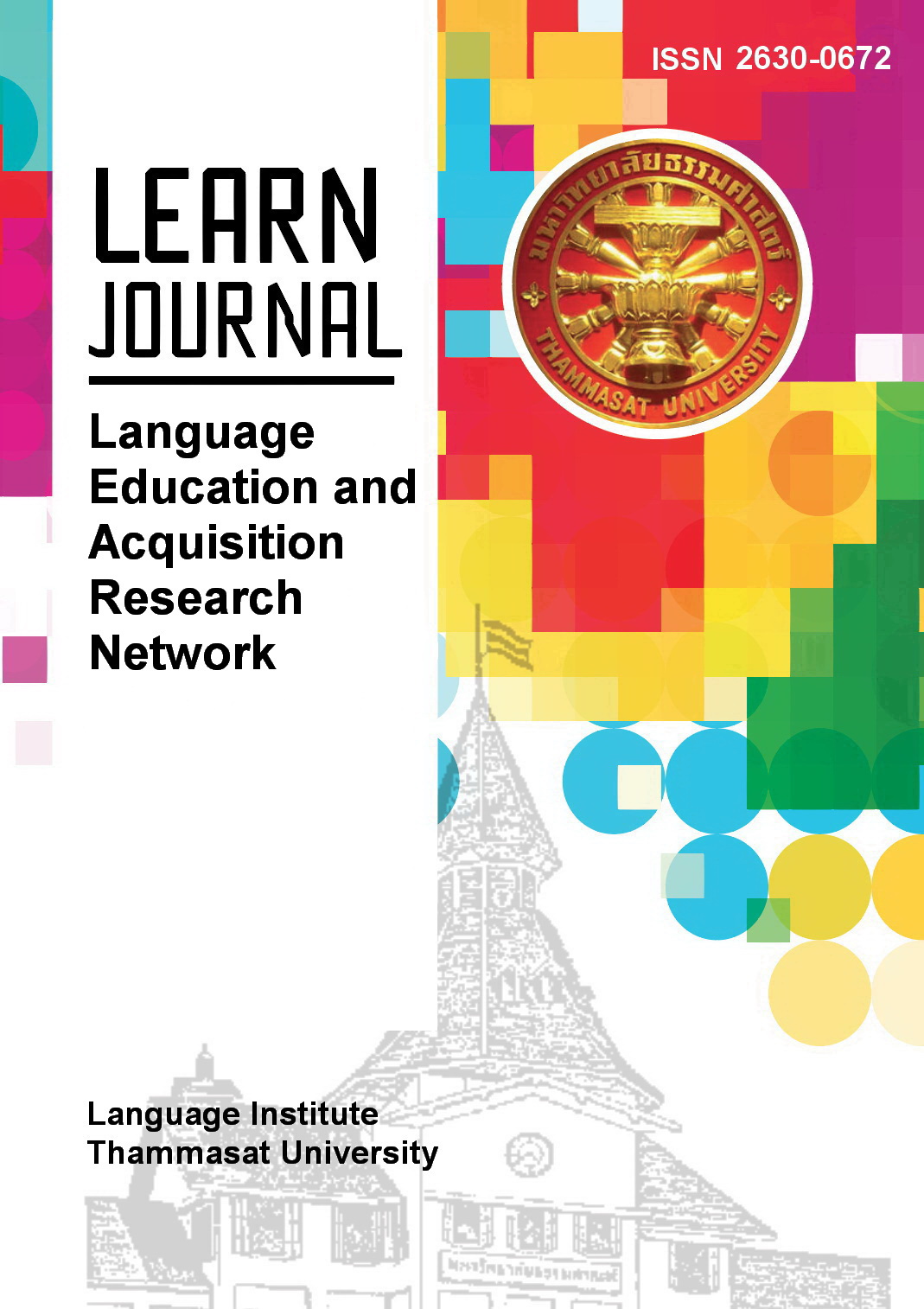Request Speech Act of Indonesian English Learners and Australian English Speakers Through Cross-Cultural Pragmatic Perspectives
Main Article Content
Abstract
This study aims to investigate the differences in the realization of request speech act between the IEL (Indonesian English Learners) and the AES (Australian English-Native Speakers), as well as explain the factors influencing these distinctions. The descriptive-qualitative method and discourse completion task (DCT) were used to obtain data in various contexts. The results showed that the realization of request speech act of the IEL and AES were different based on the following, (1) Form of Speech, as observed in the use of the main and supporting actions. This indicated that the IEL and AES used indirect and direct speech acts, respectively, and (2) Different Speech Strategies, as observed in the mode of sentences and request strategies. This proved that the IEL often used interrogative sentences, with the AES using declarative sentences when seeking permission from work superiors, and (3) Differences in the use of semantic formulas, where the IEL used attracters and honorifics more than the AES. This revealed that the linguistic and non-linguistic factors influenced the occurrences of these differences.
Article Details
References
Abdullah, A. (2017). Diplomatic relations between Indonesia-Australia since Whitlam, Fraser, until Hawke era in an attempt to establish political stability in Southeast Asia. Jurnal Ilmiah Peuradeun, 5(2), 237. https://doi.org/10.26811/peuradeun.v5i2.135
Aufa, F. (2016). The use of discourse completion task (DCT) as explicit instruction on Indonesian EfL learners’ production of suggestion acts. Journal of English and Education, 5(2), 22–43. https://doi.org/10.20885/jee.vol5.iss2.art2
Beeson, M., Bloomfield, A., & Wicaksana, W. (2021). Unlikely allies? Australia, Indonesia and the strategic cultures of middle powers. Asian Security, 17(2), 1–17. https://doi.org/10.1080/14799855.2020.1846525
Blum-Kulka, S. (1982). Learning to say what you mean in a second language: A study of the speech act performance of learners of hebrew as a second language. Applied Linguistics, 3(1), 29–59. https://doi.org/10.1093/applin/III.1.29
Blum-Kulka, S. (1987). Indirectness and politeness in requests: Same or different? Journal of Pragmatics, 11, 131–146. https://doi.org/https://doi.org/10.1016/0378-2166(87)90192-5
Blum-Kulka, S., House, J., & Kasper, G. (1989). Cross-cultural pragmatics: Requests and Apologies. Ablex Publishing Corporation.
Blum-Kulka, S., & Kasper, G. (1993). Interlanguage pragmatics. Oxford University Press.
Brown, P., & Levinson, S. C. (1987). Politeness: Some universals in language usage. Cambridge University Press.
Chaer, A. (2013). Pengantar Semantik Bahasa Indonesia. Rineka Cipta.
Collins, J. N. (2018). Analyzing meaning: An introduction to semantics and pragmatics by Paul R. Kroeger. Oceanic Linguistics, 57(2), 53–59. https://doi.org/10.1353/ol.2018.0021
Handayani, T. (2016). Tindak Tutur Meminta dalam Bahasa Inggris oleh Penutur Bahasa Indonesia dan Penutur Asli Bahasa Inggris Australia: Kajian Pragmatik Antarbahasa. Universitas Gadjah Mada, Indonesia.
Hofstede, G. H., Hofstede, G. J., & Minkov, M. (2010). Cultures and organizations: Software of the mind, intercultural cooperation and its importance for survival. McGraw-Hill.
Huang, P. (2019). Textbook interaction: A study of the language and cultural contextualisation of English learning textbooks. Learning, Culture and Social Interaction, 21(1), 87–99. https://doi.org/10.1016/j.lcsi.2019.02.006
Hymes, D. (1996). Ethnography, linguistics, narrative, inequality: Toward an understanding of voice. Taylor & Francis. https://doi.org/10.2307/415909
Hymes, D. (2012). The ethnography of speaking. In J. A. Fishman. (Ed.), Reading in the sociology of language (p. 99−138). Mouton.
Kraft, B., & Geluykens, R. (2007). Cross-cultural pragmatics of interlanguage English. Lincom Europa.
Leech, G. (2016). Principles of pragmatics. Routledge. https://doi.org/10.4324/9781315835976
Lewis, R. D. (2006). When cultures collide: Leading across cultures. Nicholas Brealey International.
McConachy, T., & Spencer-Oatey, H. (2021). Cross-cultural and intercultural pragmatics. In M. Haugh., D. Z. Kadar., & M. Terkourafi. (Eds.), The Cambridge handbook of sociopragmatics (p. 733–757). Cambridge University Press. https://doi.org/https://doi.org/10.1017/9781108954105.037
Meiratnasari, A., Wijayanto, A., & Suparno, S. (2019). An analysis of politeness strategies in Indonesian English textbooks. ELS Journal on Interdisciplinary Studies in Humanities, 2(4), 529–540. https://doi.org/10.34050/els-jish.v2i4.8393
Ogiermann, E., & Bella, S. (2020). An interlanguage study of request perspective: Evidence from German, Greek, Polish and Russian learners of English. Contrastive Pragmatics, 1(2), 180–209. https://doi.org/10.1163/26660393-bja10003
Putra, T. K., Rochsantiningsih, D., & Supriyadi, S. (2020). Cultural representation and intercultural interaction in textbooks of English as an international language. Journal on English as a Foreign Language, 10(1), 163–184. https://doi.org/10.23971/jefl.v10i1.1766
Quirk, R., Greenbaum, S., Leech, G., & Svartvik, J. (1985). A comprehensive grammar of English language. Longman Inc.
Radford, A. (2016). Analysing English sentences: A Minimalist Approach. Cambridge University Press. https://doi.org/10.1017/cbo9780511980312
Schauer, G. A. (2012). Interlanguage pragmatic development: The study abroad context. Continuum.
Sophen, T. (2007). Language typology and syntactic description. Cambridge University Press.
Widanta, I. M. R. J., Hudiananingsih, P. D., Sitawati, A. A. R., & Ardika, I. W. D. (2019). Pragmatic errors and transfer of foreign learners of indonesian: The case of refusals. Journal of Language Teaching and Research, 10(3), 501–508. https://doi.org/10.17507/jltr.1003.13
Wijana, I. D. P. (1996). Dasar-dasar pragmatik. Andi Offset.
Wijayanti, W., Wijayanto, A., & Marmanto, S. (2019). Politeness in interlanguage pragmatics of request performed by EFL learners. 8th ELTLT International Conference Proceeding (pp.316–328).
Wijayanto, A. (2016). Variability of refusal in L2: Evidence of L1 pragmalinguistic transfer and learner’s idiosyncratic usage. International Journal of Applied Linguistics (United Kingdom), 26(1), 99–119. https://doi.org/10.1111/ijal.12081


